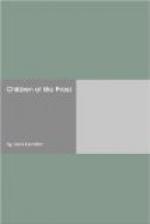“There were no paddles?” Opee-Kwan asked softly, returning the pipe.
“The south wind was behind,” Nam-Bok explained.
“But the wind-drift is slow.”
“The schooner had wings—thus.” He sketched a diagram of masts and sails in the sand, and the men crowded around and studied it. The wind was blowing briskly, and for more graphic elucidation he seized the corners of his mother’s shawl and spread them out till it bellied like a sail. Bask-Wah-Wan scolded and struggled, but was blown down the beach for a score of feet and left breathless and stranded in a heap of driftwood. The men uttered sage grunts of comprehension, but Koogah suddenly tossed back his hoary head.
“Ho! Ho!” he laughed. “A foolish thing, this big canoe! A most foolish thing! The plaything of the wind! Wheresoever the wind goes, it goes too. No man who journeys therein may name the landing beach, for always he goes with the wind, and the wind goes everywhere, but no man knows where.”
“It is so,” Opee-Kwan supplemented gravely. “With the wind the going is easy, but against the wind a man striveth hard; and for that they had no paddles these men on the big canoe did not strive at all.”
“Small need to strive,” Nam-Bok cried angrily. “The schooner went likewise against the wind.”
“And what said you made the sch—sch—schooner go?” Koogah asked, tripping craftily over the strange word.
“The wind,” was the impatient response.
“Then the wind made the sch—sch—schooner go against the wind.” Old Koogah dropped an open leer to Opee-Kwan, and, the laughter growing around him, continued: “The wind blows from the south and blows the schooner south. The wind blows against the wind. The wind blows one way and the other at the same time. It is very simple. We understand, Nam-Bok. We clearly understand.”
“Thou art a fool!”
“Truth falls from thy lips,” Koogah answered meekly. “I was over-long in understanding, and the thing was simple.”
But Nam-Bok’s face was dark, and he said rapid words which they had never heard before. Bone-scratching and skin-scraping were resumed, but he shut his lips tightly on the tongue that could not be believed.
“This sch—sch—schooner,” Koogah imperturbably asked; “it was made of a big tree?”
“It was made of many trees,” Nam-Bok snapped shortly. “It was very big.”
He lapsed into sullen silence again, and Opee-Kwan nudged Koogah, who shook his head with slow amazement and murmured, “It is very strange.”
Nam-bok took the bait. “That is nothing,” he said airily; “you should see the steamer. As the grain of sand is to the bidarka, as the bidarka is to the schooner, so the schooner is to the steamer. Further, the steamer is made of iron. It is all iron.”
“Nay, nay, Nam-Bok,” cried the head man; “how can that be? Always iron goes to the bottom. For behold, I received an iron knife in trade from the head man of the next village, and yesterday the iron knife slipped from my fingers and went down, down, into the sea. To all things there be law. Never was there one thing outside the law. This we know. And, moreover, we know that things of a kind have the one law, and that all iron has the one law. So unsay thy words, Nam-Bok, that we may yet honor thee.”




